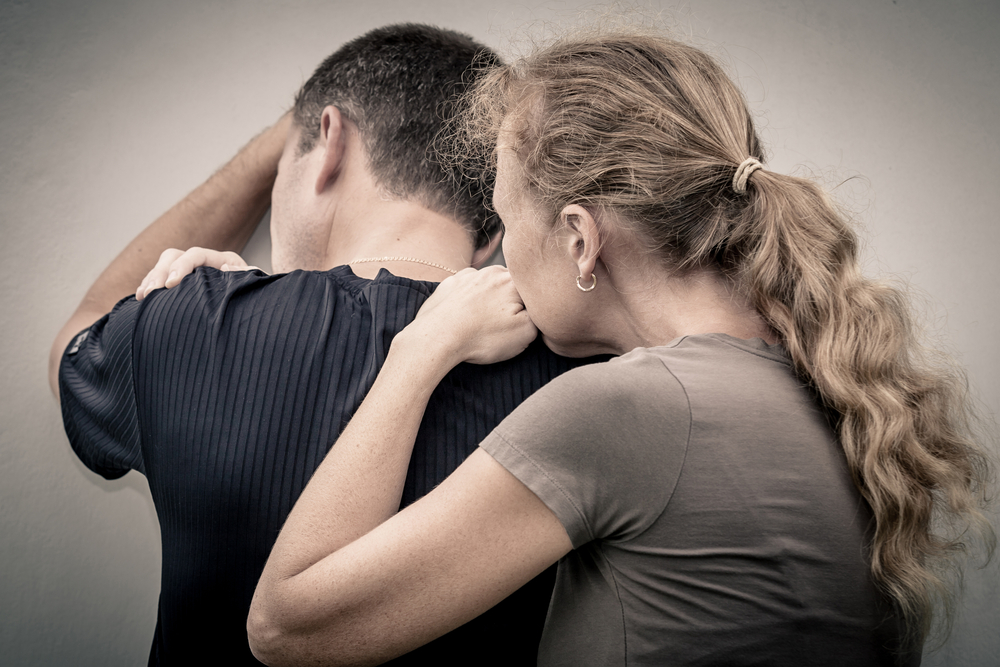Last Updated:
August 8th, 2025

Research from Taking Action UK highlights that nearly half of all adults have either experienced or know someone with a drug or alcohol addiction. Across the country, this equates to 23 million adults affected by addiction.
For anyone out there who loves a person who is hurting, we know that sometimes, this means you hurt, too. It is our wish to reinforce your love and support you both towards a happier, healthier tomorrow.
We’re giving you ways to protect your own well-being while supporting a loved one battling addiction.
The inherent chaos in loving an addicted person
Every one of us goes through life loving someone. Relationships with friends, family and loved ones can become as essential as the air we breathe. Whether the love is romantic or platonic, we often need to build with someone for safety, shelter and a sense of unity that gives life meaning.
With a loved one, we can start to build the house of tomorrow with the bricks of today. Yet working towards a stable future with an addicted person can feel like constructing a house on a fault line. You strive day in and day out to develop stability and foundational strength in the relationship. One moment, everything looks fine, then the next, the ground feels like it gives way. Their addiction can put you in the crosshairs of cold silence, deception, mood swings and emotional relapses. It’s a cycle that leaves you emotionally disoriented and in need of greater stability.
This inherent chaos is what makes loving an addict uniquely heartbreaking. You might feel as though you’re constantly adjusting your expectations or preparing for the next crisis. It’s not unusual to start questioning your own capacity for caregiving.
If you’ve ever thought, “Why can’t I just walk away?” or “Why do I keep hoping things will change?” you are certainly not alone. The questions are part of the emotional labyrinth of loving someone with an addiction. We’re here to help you find your bearings once more.
Why does it feel like I can’t fix their situation?
Loving an addicted person can make your relationship swing between polarising feelings. On one side is a profound sense of care and purpose, while on the other side are the most damaging feelings of deception and secrecy. In the middle of this swing lies the driving force of wanting to fix the situation.
This can be one of the hardest emotional truths to accept: you cannot recover from addiction on their behalf. No matter how deeply you care or how much of yourself you give up for them, recovery is a process that they can only carry out alone. You can be there for them and you can help in your own way, but the addiction recovery process can only be carried out in their body, not yours.
Your love is never wasted. Family support and care for an addicted loved one won’t always come in the form of direct solutions. Sometimes, it means just being a steady presence in their life. It may be holding a boundary or staying grounded while they ride their own storm. It may mean recognising that your role is not to fix but to care. That care is an eternally powerful force in addiction recovery, even when it doesn’t lead to immediate change.
The emotional whirlwind of loving an addict
With our loved ones, we rarely, if ever, want to stop showing them care and support as they go through difficult times. Your emotions can feel like a grain of sand drifting through a raging storm, swept by hope, anger, guilt, fear and exhaustion.
Emotional swings are a natural response to the unpredictability and inherent intensity that addiction brings into a relationship. Here are some of the common emotional states people, unfortunately, experience with a loved one caught in addiction:
Steps you can take today to rebuild your strength
While you might not be able to change or stop your loved one’s addiction at the moment, you can make meaningful moves to restore your own balance and mental health. Here are some steps you can take to create structure when surrounded by emotional chaos:
I’m struggling to cope – where can I find help?
Having a loved one struggle with addiction can be one of the most heartbreaking things you can ever witness. You may feel lost and confused, but you are not alone, and you don’t have to manage the pain by yourself.
At UKAT, we understand the tragic toll addiction takes on families and loved ones. Our addiction rehab and treatment plans go beyond individual recovery. We offer family support services with expert therapists to create a space of compassion where your voice matters, too.
If you’re looking for professional advice or rehab options for your loved one, we’re here to listen, guide and support you.
Reach out today. You deserve support just as much as the loved one you’re trying to save.
(Click here to see works cited)
- “New Poll Reveals Toll of Addiction across the UK.” Taking Action on Addiction, takingactiononaddiction.org.uk/news/new-poll-reveals-toll-of-addiction-across-the-uk
- Bistas K, Grewal R. The Intricacies of Survivor’s Guilt: Exploring Its Phenomenon Across Contexts. Cureus. 2023 Sep 21;15(9):e45703. doi: 10.7759/cureus.45703. PMID: 37868549; PMCID: PMC10590163.



